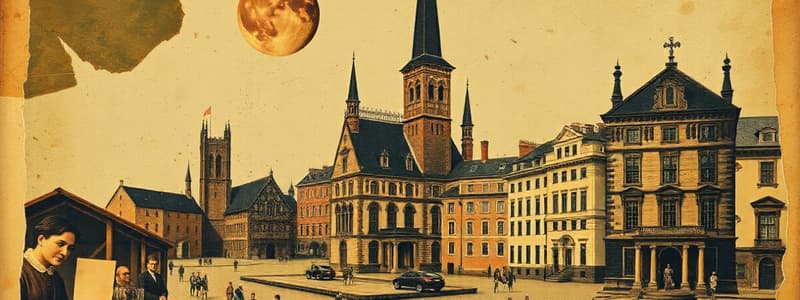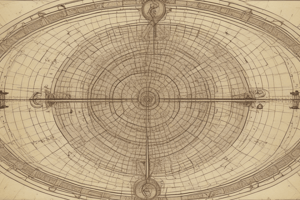Podcast
Questions and Answers
What term describes the belief that one's own culture is superior to others?
What term describes the belief that one's own culture is superior to others?
- Imperialism
- Expansionism
- Eurocentrism (correct)
- Consumerism
Which of the following was a motivation for Western European exploration?
Which of the following was a motivation for Western European exploration?
- Increase in wealth and power (correct)
- Creation of city-states
- Desire for cultural exchange
- Religious reform
What consequence did ethnocentrism have on indigenous populations during European expansion?
What consequence did ethnocentrism have on indigenous populations during European expansion?
- Imposition of Western worldviews (correct)
- Independence of native societies
- Strengthening of local traditions
- Increased cultural exchange
Which of the following best describes the impact of the Reformation in Europe?
Which of the following best describes the impact of the Reformation in Europe?
What role did technology play in the context of the Western European exploration?
What role did technology play in the context of the Western European exploration?
What was a major factor in the shift from the Medieval worldview to the Renaissance worldview?
What was a major factor in the shift from the Medieval worldview to the Renaissance worldview?
Which city-state was known as the richest during the Renaissance period?
Which city-state was known as the richest during the Renaissance period?
Which aspect of society is NOT directly affected by one's worldview?
Which aspect of society is NOT directly affected by one's worldview?
What led to the increased power of urban centers during the Renaissance?
What led to the increased power of urban centers during the Renaissance?
Which of the following best describes the changes in citizenship and civic responsibility during the Renaissance?
Which of the following best describes the changes in citizenship and civic responsibility during the Renaissance?
What was a common characteristic of city-states like Genoa and Venice?
What was a common characteristic of city-states like Genoa and Venice?
What role did the Medici family play in Florence during the Renaissance?
What role did the Medici family play in Florence during the Renaissance?
Which was NOT a contributing factor to the Renaissance worldview?
Which was NOT a contributing factor to the Renaissance worldview?
Flashcards
Worldview
Worldview
A person's beliefs and values that shape their understanding of the world, influencing their decisions and actions.
Factors affecting a worldview
Factors affecting a worldview
The geographic location, contact with different cultures and ideas, and access to knowledge all play a part in shaping a person's worldview.
The Renaissance
The Renaissance
A time period in European history marked by a renewed interest in classical learning and culture, leading to significant changes in art, science, and society.
Feudal System
Feudal System
Signup and view all the flashcards
Medieval Europe
Medieval Europe
Signup and view all the flashcards
Factors shaping the Renaissance worldview
Factors shaping the Renaissance worldview
Signup and view all the flashcards
City-States
City-States
Signup and view all the flashcards
Imperialism
Imperialism
Signup and view all the flashcards
Ethnocentrism
Ethnocentrism
Signup and view all the flashcards
Eurocentrism
Eurocentrism
Signup and view all the flashcards
Era
Era
Signup and view all the flashcards
Study Notes
Renaissance Europe Unit Summative
- Worldviews: Understanding worldviews helps understand others' choices. Factors are geography, contact with other groups, and knowledge. Worldviews affect social systems (importance of individual, social mobility, family structures, gender roles, classes), political and economic systems (citizenship, business, trade, materialism, economy, government), and culture (importance of knowledge, organized religion, arts, customs, traditions, architecture, language).
Middle Ages vs. Renaissance Worldview
-
Medieval Europe: The Church dominated life, and superstition was prevalent. Feudal social structure meant subservience to nobles. Peasants faced short, harsh lives.
-
Renaissance Europe: The Church was challenged. Superstitious beliefs declined, and opportunities increased for peasants. A focus on humanism led to more civic involvement. Trade, industry, and banking in urban centers grew.
Renaissance Europe
- Factors shaping Renaissance worldview: Increased trade, rise of the merchant class, growth of cities, and increased demand.
- Ancient world interest: Renewed interest in ancient culture, styles, and knowledge in religion, science, politics, arts, math, and astronomy.
- Trade patterns: Trade routes moved east-to-west, like the bubonic plague.
City-States
- Geographic importance: Location was crucial to city-state development.
- Large European cities (14th century): Genoa, Venice, Florence, and Paris were prominent.
- Florence: Rich, along the Arno River, ruled by the powerful Medici family, starting as a republic and becoming an oligarchy.
- Genoa: A "walled city", known for its two faces. A major rival of Venice, and a transport hub for armies going to the Holy Lands.
Studying That Suits You
Use AI to generate personalized quizzes and flashcards to suit your learning preferences.




